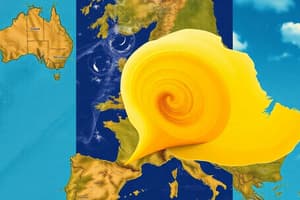Podcast
Questions and Answers
What does the cloud cover symbol 'Overcast' represent?
What does the cloud cover symbol 'Overcast' represent?
The sky is uniformly covered with clouds.
Describe the cloud cover symbol 'Cirrus clouds'.
Describe the cloud cover symbol 'Cirrus clouds'.
High altitude clouds composed of ice crystals.
What type of weather is often associated with 'Altostratus clouds'?
What type of weather is often associated with 'Altostratus clouds'?
They often precede a storm.
Explain the cloud cover symbol 'Mixed stratiform and cumulonimbus'.
Explain the cloud cover symbol 'Mixed stratiform and cumulonimbus'.
Why is it important for meteorologists to understand cloud cover symbols on weather maps?
Why is it important for meteorologists to understand cloud cover symbols on weather maps?
How have weather forecasting tools evolved over time?
How have weather forecasting tools evolved over time?
What does a hygrometer measure?
What does a hygrometer measure?
Why is an anemometer important for weather forecasting?
Why is an anemometer important for weather forecasting?
How does a weather balloon contribute to weather forecasting?
How does a weather balloon contribute to weather forecasting?
What role does a barometer play in predicting weather changes?
What role does a barometer play in predicting weather changes?
What is the function of Doppler radar in weather forecasting?
What is the function of Doppler radar in weather forecasting?
Explain the importance of satellites in weather forecasting.
Explain the importance of satellites in weather forecasting.
Flashcards are hidden until you start studying
Study Notes
Cloud Cover Symbols on Weather Maps
Understanding cloud cover symbols is crucial when reading weather maps, as these symbols represent various degrees and types of cloud coverage. These symbols allow meteorologists to interpret the sky's appearance, which can influence weather conditions and potential hazards. Here are some common cloud cover symbols:
- Clear sky: No clouds present.
- Mostly clear: Some clouds present, but mostly clear.
- Partly cloudy: Partly covered with clouds but partly clear.
- Overcast: The sky is uniformly covered with clouds.
- Clouds blowing from: Clouds are moving across the sky.
- Cirrus clouds: High altitude clouds composed of ice crystals.
- Stratus clouds: Low altitude clouds that often bring overcast weather.
- Altocumulus clouds: Cumulus clouds at mid-altitude, which can indicate instability in the atmosphere.
- Altostratus clouds: Mid-level clouds that often precede a storm.
- Mixed stratiform and cumulonimbus: This symbol indicates a mixture of scattered clouds of varying types and potentially significant weather events like thunderstorms.
Weather Instruments and Their Measurements
To accurately forecast weather conditions, meteorologists need reliable measurement tools. Over time, the field has evolved from relying on traditional instruments like thermometers and barometers to incorporating advanced technologies such as radars, satellites, and computer simulations. Here are some key instruments used in weather forecasting:
- Thermometer: Measures temperature, which is essential to understanding heating and cooling rates in the atmosphere.
- Barometer: Measures air pressure, which helps predict weather changes and identify storms.
- Anemometer: Measures wind speed and direction, which is crucial for forecasting precipitation and wind conditions.
- Hygrometer: Measures humidity, which can affect temperature and precipitation patterns.
- Weather balloon: Releases into the atmosphere to measure temperature, humidity, and wind patterns at various altitudes.
- Doppler radar: Detects precipitation and wind patterns in the atmosphere.
- Satellites: Provide global coverage of weather conditions, including cloud patterns, ocean surface temperature, and atmospheric moisture.
- Computer models: Use mathematical equations and atmospheric data to simulate weather conditions and forecast future weather patterns.
These instruments provide the data necessary for weather forecasting, and their measurements are used to create forecasts and issue weather warnings.
Studying That Suits You
Use AI to generate personalized quizzes and flashcards to suit your learning preferences.




